
Dubai: UAE car dealerships are keeping their eyes glued to the horizon — to see whether the market bottoms out this year itself. Or whether their pain is going to continue into next year as well.
Since end 2015, new car sales in the UAE are down by a staggering 45-50 per cent, according to market sources, with Q1-18 alone seeing a decline of 15-20 per cent after just over 50,000 units got sold. No dealership has managed to stave off the brunt of market forces, and even categories such as the premium end — down 15 per cent over the last two years — are feeling the squeeze on margins and indifferent buyer sentiments.
“My expectation is that the market will hit rock bottom this year itself,” said Michel Ayat, CEO of AW Rostamani Automotive, the dealership for Nissan, Infiniti and Renault. “But even if it does, the industry should not raise hopes too soon — chances are that the growth next year will only be around 5 per cent or so.”
But after two extremely tough years, dealerships will take anything where they can show some growth. New car sales in the UAE had closed 2015 at the 420,000 unit mark, then slipped to 320,000 the next year and 280,000 in 2017. For an industry roughly valued at Dh100 billion, the year-on-year declines are leaving dents on their operations.
“But there’s still no need for outright panic … whatever be the end-of-year numbers,” said Ayat. “It’s only the retail business that is passing through a steep decline; fleet sales, the rental operations and those of certified pre-owned vehicles are still holding up.
“What dealerships need to understand, irrespective of their size, is that they cannot get by on short-term strategies and trying to use discounts to clear their stocks. After a while, it will stop yielding results … or come at a great cost.”
For the moment, all dealerships have got their Ramadan promotions going, a 45-day run they hope will convince some buyers to buy a new model or trade up. From a car owner’s perspective, this is as good a time as any to make up their minds.
Dealerships are offering 0 per cent interest rate, over a four-year term as in the case of Arabian Automobiles, or straight “savings”, such as Al-Futtaim Toyota which is promising up to Dh40,000 on certain new model sales and up to Dh10,000 on pre-owned. They are even throwing in “gold vouchers”, as is the case for any new Renault sold during the period. Some spike in sales — the recent announcement of government bonuses should help — and that should give some breathing room for dealerships until end of summer.
Market sources say that all through the first six months, dealerships have had some sort of campaign going on, nearly all of them aimed at reducing the cost of acquisition on a new car. In a cost-conscious marketplace, most consumers, it seems, can only be swayed on prices.
Of course, there are the exceptions, as evidenced by the response to the first ever Rolls-Royce SUV, the Cullinan. Even with a price tag of Dh2.2 million and priority being assigned to existing Rolls owners, the initial bookings have been heavy, according to Abu Dhabi Motors, the marque’s dealer for Abu Dhabi. But the likes of the Cullinan make their own fortunes.
Thankfully, the time out, dealerships in the UAE are not burdened by sizeable unsold inventory. According to Cedric Zayoun, Managing Director for the Gulf markets at the French carmaker PSA, this is because the nature of market dynamics have changed.
“Earlier, a lot of exports used to happen of cars shipped into the UAE,” said Zayoun. “I would estimate up to 30 per cent in the case of the big importers. But, now, manufacturers are regulating the exports and closing the doors on shipments made by local dealerships to other markets.
“The market has been adjusting to this change … gradually. But it’s still a much needed change — dealerships have to learn to make do selling in their own market and not elsewhere.”
But how good are UAE’s dealerships getting in managing their shipments and stocks? One bad quarter of poor sales can mess up the best-laid plans.
“Ideally, a dealership is committed for six months — it will have two to three months of stocks locally, another month’s worth of shipments coming in by sea, and confirmed orders for another two to three months,” said Ayat. “If you want to adjust this any further, it will take you six months to get the results. The situation now is infinitely better than what was experienced in 2009-10.
“Even then, inventory has to be tailored to the demands of the market — it is wrong to keep cutting prices just to clear stock. Indirectly, you end up shooting yourself in the foot.”
French carmaker PSA is still putting together a Gulf gameplan
France’s PSA, the name behind Peugeot and Citroen, says it’s only getting started with its offensive on the Gulf markets.
“We launched two models — the 3008 and 5008 — so far as part of our relaunch here,” said Cedric Zayoun, who heads the regional operations. “Whatever we have received of the 3008 is out on the roads.
“Whatever we bring to the Gulf markets will bear the golden rule — they need to be 120 per cent fit for the Gulf. We have to make them Gulf-proof.”
Later this year, PSA will introduce a top-of-the-line Peugeot sedan, a fully remodelled 508.
On a parallel track, “This year is about confirming new partners in some of the Gulf markets,” said Zayoun. “You could bring in the best models, but without the partners, they end up going nowhere. We are not very present in Saudi Arabia and that will change.”












